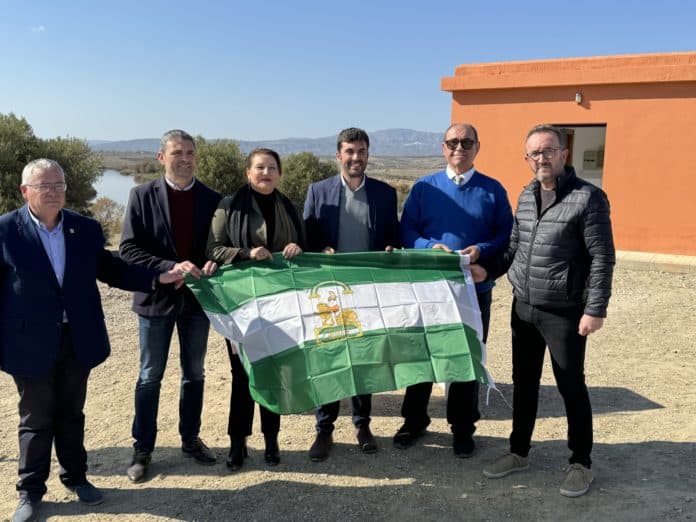Carmen Crespo lays the first stone of the new pipelines and WWTP that will provide service to 53,800 residents of Almeria in five municipalities
The Regional Minister of Agriculture, Fisheries, Water and Rural Development, Carmen Crespo, has laid the first stone of the works of the Mojácar (Almería) group of discharges and Wastewater Treatment Plant (WWTP) together with the mayor of this Almeria municipality, Francisco García, and of the other four localities that benefit from the new hydraulic infrastructure. Specifically, the mayors of Garrucha, Pedro Zamora, Los Gallardos, Francisco Miguel Reyes, Turre, Damián Arturo Grima, and Bédar, Francisco Collado, took part.
This Junta de Andalucía initiative responds to a historical demand by the inhabitants of this area
of Almeria. “These municipalities have needed this infrastructure for a long time, which has been the subject of debate in plenary sessions, but that from now on, will bring great satisfaction,” Crespo commented. In total, 53,800 residents of five municipalities benefit from this hydraulic action.
In her intervention, the regional minister highlighted that this new group of discharges and the treatment plant, which involve an investment of 19 million euros, “will improve the area from an environmental point of view and in addition, will give a new hydrological opportunity to the region.” In this regard, she explained that this WWTP will be able to incorporate a tertiary treatment “that allows for taking advantage of up to 4hm³ of regenerated water in
the Levante area of Almería in various uses, among which agricultural stands out” followed by other areas that contribute to continuing to driving “the business dynamism of the region.”
Carmen Crespo stressed that this initiative will make “the Levante area of Almería’s first state-of-the-art technology infrastructure” a reality, detailing that the project provides for, among other works, the execution of eight pumping stations and 14 main pipelines that, overall, reach 28.6 kilometres in length. Regarding the new treatment plant, she highlights that it will have the capacity to treat more than 25,200m³ of wastewater per day. In respect to the time frame for execution, it is estimated that the works will last 24 months, adding the construction of the infrastructure and the trial period prior to it officially being put into operation.
For the regional minister, the impetus for this action is “all benefits” as it entails “investment in the area, the creation of jobs and new hydraulic infrastructure of great relevance for a Levante
that suffers the effects of drought.”
Carmen Crespo thanked the mayors for “the commitment of the local administration” and also highlighted the existing collaboration with the Almería Provincial Council, demanding at the same time the greater involvement of the Spanish Government in the field of desalination. As an example of the requests put forward by Andalucía to the State, the regional minister has pointed out the need to “put into operation the at least 5hm³ of the Alto Almanzora and that Carboneras has the maintenance it needs.”
Junta’s star politician
During her speech, Crespo stressed the importance of “hydraulic works being a priority.”
in administrations’ investments, above all in a situation of drought as currently.”
The regional minister valued that “the president of the Junta is currently in Brussels requesting
climatic singularity for Andalucía and trying to ensure that resources such as those from the solidarity fund, which have previously been used in catastrophe situations, come to support investments that are very necessary in our land.” “Decades ago in Andalucía, hydraulic infrastructure construction projects were left on hold that we now greatly need,” lamented Carmen Crespo.
The person responsible for Water in Andalusia stated that she continues with “her personal commitment and that of the Junta President” in this area, an effort that has allowed “hydraulic works to currently be 42% of the Junta de Andalucía’s public works when previously it was practically non-existent.” “We have to reinforce this trend now and when this drought is over because then we will be more prepared for the following period of shortage registered in this Autonomous Community especially affected by climate change,” affirmed Crespo.





